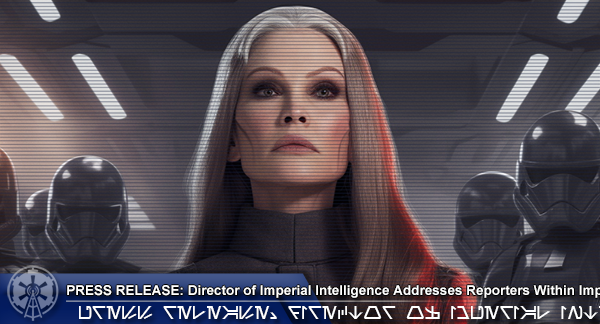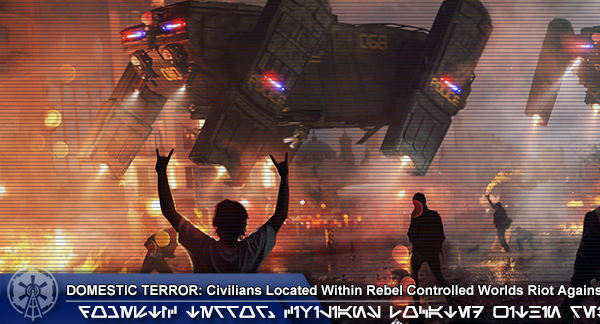Coruscant – Imperial Intelligence officials’ release of classified documents has caused a deepening rift between the Rebel Military and their own Intelligence forces, as discussions around changes to the Rebel Charter appear to be reaching a boiling point. Proposed changes aim to clarify the division of powers between the two groups — an increasingly contentious issue following accusations of espionage made against Larry Turner, the Deputy Chief of Military Operations.
His status as member of the Advisory Council notwithstanding, Turner was blocked from providing input due to his pending trial, a decision which caused further tension within the Rebel Alliance, and even sparked Director of Imperial Intelligence, Elaine von Veritrax, to comment on the trial and the apparent disconnect between the Rebel leadership and their junior officers, citizens, and allies.
“The Supreme Commander, along with the Advisory Council, has transformed into a self-serving oligarchy, prioritizing the preservation of their own image of competency and stability. The leadership of the Rebellion allows their allies to flaunt power and decide the strategic direction of the Rebellion, in short Chran and his followers are naught but puppets. The Advisory Council of Rebellion lack the moral, and influential authority needed to effectively challenge the fracturing. Compared to their allies, the Rebellion pales in comparison, continuously offering themselves in service but failing to attain the same level of influence. They continue to be the epitome of backwards dogma.”

Supreme Commander of the Rebellion, Orion Chran, has taken a passive approach to the increasing pressure surrounding the trial, to the frustration of the heads of the Rebel Military and Rebel Intelligence. Chran’s indecisiveness is a source of wide concern within the Rebellion, as the infighting between these two groups is spilling over into civil branches, creating a dangerous situation for those under their varying commands.
Furthermore, the financial burdens placed on the populace within rebel-controlled planets by the military and intelligence apparatus have caused backlash from the rest of the Advisory Council. Despite requests to cut back on government spending, political and financial analysts were issued gag orders by Rebel Intelligence officials, further exacerbating the tensions within the Alliance.
Desperate to hold the fragmenting Alliance together, the Advisory Council has resorted to deploying personnel away from the home front to support deep space searches for planetary bodies, as subordinates to their allies. Confusion and surprise at such a decision has been notable among political analysts, who see the expenditure of resources and time as wasteful in the light of towering budgetary expenditure and a need to provide economic investment at home.
This domestic situation has reached a critical breaking point, as the unchecked government power has sparked riots on rebel-aligned worlds. The populace is increasingly disillusioned with a domestic policy that is widely seen as completely disconnected from reality. The citizens’ frustration is palpable, and their grievances against the ruling oligarchy have escalated to a boiling point. The Rebellion’s cause has begun to wane in strength from the people’s discontent, as they witness firsthand the consequences of a regime that fails to address the fundamental needs and concerns of its citizens.

As the Rebellion fractures into various sub-factions, individual Advisory Council members are gathering supporters into their corners. In a chaotic system where there is no higher power to regulate relations with one another unfortunately it seems violence remains a valid means of dispute resolution, generating disconcerting uncertainty and fear for civilians caught in matters of competing personal interests masquerading as national security.
The Rebellion’s inherent tendency towards force and coercion as a means of persuasion continues to divide its society as squabbling leaders compete for absolute power. Clearly, the Rebellion and its leaders remain ill-equipped for galactic governance, a task demanding foresight, prudence, and the ability to rationally match commitments to resources whilst balancing strategic needs. Here it finds itself fundamentally outclassed by the Galactic Empire, which despite its critics has undeniably maneuvered into position as the galaxy’s strongest and most stable government. Ultimately the Rebel Alliance will be unable to resolve its internal divisions and find a more effective way of governing, it is doomed to fail in its fight against the Empire and its allies – perhaps Chran’s deliberate indecision and passivity are made manifest in the Alliance’s apparent commitment to maintaining the status quo not only internally but on the galactic stage. This is perhaps most expressively made true in their handling of international affairs as the Supreme Commander and his senior most advisors continue to fumble managing their alliances and a web of conflicting diplomatic agreements.

